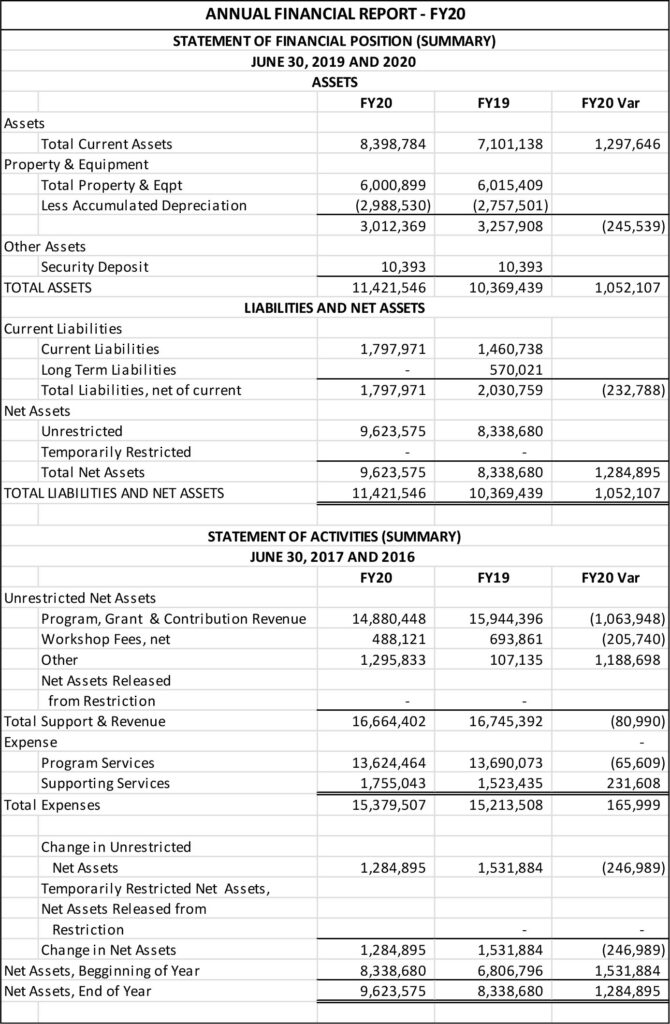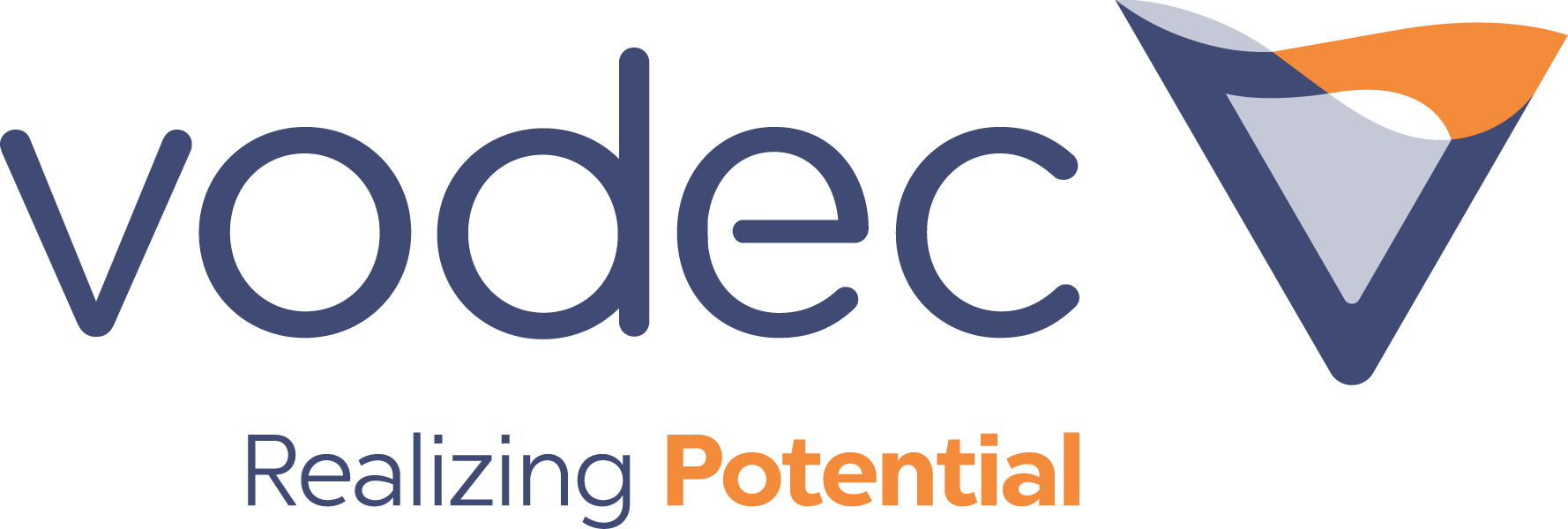by Vodec CEO Steve Hodapp
It’s customary for us to deliver a wrap up of the most recent fiscal year. In a nutshell, we were having a really good year through February 2020. We completed a right-sizing of our supported employment program, our day programs were performing well and residential services were growing. We were in very good shape financially. March came with the COVID-19 pandemic, and challenges followed.
I hate to make this report on FY2020 seem COVID-heavy, but let’s be honest, it was the BIG event of the fiscal year. It reduced participation in and revenue from our day programs. All sorts of COVID-specific expenses were created and scaled up fast. And we were forced to get creative in how to provide services.
We personally delivered material to the homes of consumers who suspended their on-site participation. We created a whole virtual service delivery model seemingly overnight and brought on a consultant to help improve Zoom skills and create new ways to keep consumers engaged. While COVID-19 was present during only four months of the fiscal year, it made those months seem to dominate the rest of the year. But through it all, we managed to continue to put consumers first. A few of the highlights for FY2020 follow. Not all are about COVID-19. There were other activities happening. It just didn’t always seem like it.
July 1, 2019
- Iowa Total Care replaced United Health Care as one of Iowa’s two managed care organizations (MCOs). The other is AmeriGroup. Iowa’s plan was to bring on a third MCO in 2021. This caused another re-assignment of Medicaid members ( including our consumers) between the two MCOs. P.S. The onset of COVID-19 pandemic in March 2020 put the plan to add a third MCO on indefinite hold.
August 2019
- Vodec’s Board of Directors approved an early pay off of the mortgage on our Omaha Development Center.
- The Iowa Division of Vocational Rehabilitation Services (DVRS)acknowledged Vodec as the only Iowa provider receiving a top rating of 10 for its supported employment services provided during the prior fiscal year.
- Vodec continued transitioning from contracted transportation service in Nebraska after recently learning from the Nebraska Division of Developmental Disabilities (DDD) that we couldn’t use a third party to provide transportation to our Nebraska Medicaid-supported consumers. By the time this transition is completed we’ll have purchased 20 vehicles to use in Nebraska, including three minibuses.
November 2019
- Vodec started requiring a payment for a service agreement with consumers or guardians for situations when a service funder allows a service authorization to lapse. We also initiated a practice of putting a consumer’s service on hold during a lapse of service authorization. During a lapse, the service funder does not reimburse a provider for services that continue to be provided to the consumer.
- After receiving technical assistance from the Centers for Medicare and Medicaid Services (CMS), and with CMS’ approval of the revisions to the prevocational service definition under the Medicaid DD Waiver amendments, Nebraska’s DDD implemented a policy change to allow an applicant for prevocational or supported employment service funding from DDD prior to his/her referral to Nebraska DVRS. In addition, when a participant is currently on the DVRS wait list, prevocational may be authorized for a consumer to maintain learned employable skills.
January 2020
- Iowa DHS accepted Vodec’s action plan to meet HCBS settings rules for having consumers who are participating in
facility-based day programs to have more off-site experiences leading to community integration by March 15, 2022. Settings rules are issued by CMS. - Vodec continued to struggle in January to get full payment for services from Iowa Total Care (ITC). Claims have consistently been denied or short paid for no valid reason. This goes beyond Vodec. In January, Iowa Medicaid Enterprise’s director announced $44 million would be withheld from ITC until it paid at least 75 percent of the 106,000 unpaid claims to Iowa Medicaid service providers. For now, our receivables continue to increase.
- Progress continued on a remodel of our Omaha Development Center to make it more accommodating and accessible, and to refresh the whole environment for consumers and employees.
- Vodec launched a community-based work experience program for local students attending services through the Council Bluffs Development Center.
February 2020
- Nebraska DDD started requiring providers to complete annual cost reports now. They are expected to be impactful on service rates to providers in FY21. Vodec volunteered to be in a small group of providers to pilot a test reporting form. Cost reporting has been an ongoing practice in Iowa for many years, so we had some experience to offer.
March to June 2020
- COVID-19 is acknowledged as a pandemic.
- The U.S. Department of Health and Human Services declared a national health emergency that ultimately extended into January 2021.
- Nebraska Gov. Pete Ricketts started issuing public health directives.
- Iowa Gov. Kim Reynolds started issuing public health emergency proclamations. One impact of these proclamations ultimately shut down day programs throughout the state from March through June, including ours in Council Bluffs and Urbandale.
- Schools were closed, re-opened, and offering a mix of live and virtual learning with students. This negatively impacted our ability to service students in our Adult Transition Program in Council Bluffs and work experience program in Omaha.
- Onsite participation in our day programs in Iowa and Nebraska fell off as a result of consumers staying home by their choice or a choice made for them by their guardians or residential providers.
- Vodec ramped up capacity to virtually deliver day programs to consumers not participating on site.
- Vodec applied for and ultimately received more than $2.5 million in federal, state and local CARES Act funding and Payroll Protection Program assistance before the end of 2020 to help with COVID-related expenses.
- Nebraska service rates were temporarily increased through 2020 as part of an Attachment K amendment to the state’s HCBS waivers.
Consumer Census
The number of consumers served reduced by a net of 103 from the prior fiscal year. This reduction was self-imposed through our decision to discontinue supported employment service in Nebraska and central Iowa.
After many years of providing this important service as part of a natural continuum of services involving employment training and employment in the community, there had to be a business decision made. Service rates through state and federal resources were simply not covering the cost of providing the service.
This decision was not an easy one because it is such a necessary support for helping persons with developmental disabilities find and retain employment in their communities. But obviously not important enough, despite all the national rhetoric endorsing it to actually fully fund it.
Thankfully, the Southwest Iowa Mental Health/Developmental Disabilities Region does believe in the importance of it. The Region’s leadership provides grants which help support the supported employment service we provide within the region.
Participation in our day programs took a hit from COVID-19 from March to June 2020. Prior to COVID-19, the participation was pretty robust. But some consumers chose to avoid on-site day programs we provide, and others had the decision made for them by their guardians or residential providers during those months.
In response, we began to increase our Zoom skills and offered day activities virtually. The acceptance wasn’t as solid as we’d have liked, but for the consumers who found this a way to stay connected with their friends at Vodec, it was worth making this virtual option available. And it continues to be available in FY2021.
Extraordinary Expense
COVID-19 also created a lot of extraordinary expenses for us that we otherwise would not have had. There were what seemed like
unending bottles of disinfectant, hand sanitizer and the like. There were necessary costs associated with having an ability to provide virtual services to those consumers not participating in regular on-site day programs. There were air purifiers and space dividers for tabletops, vehicles and reception areas. And lots more too numerous to mention here. Fortunately, to cover these COVID-related expenses, we received more than $593,000 in regional, state and federal CARES Act grants.
We also received a Payroll Protection Program (PPP) loan of $1.63 million toward avoidance of reducing numbers of employees as a result of the impact from COVID-19 on revenues. While this originated as a loan, our goal was to be able to meet the benchmarks from the Small Business Administration to eventually have it forgiven in FY2021. By the end of FY2020, we were on the path toward total forgiveness. The PPP enabled us not to do any COVID-related furlough or layoff of any employee in FY2020.
As the pandemic hit, Vodec was fortunate to be in solid financial health. In part, that helped us face the fiscal demands of providing the broad spectrum of services we offered with less income as a result of reduced participation.
Some, but certainly not all, of the income lost was recovered through federal provider relief grants for retention funding. These were possible through the states’ HCBS Appendix K waiver amendments approved by CMS. For us, this amounted to a little more than a month of lost day program service fees. There were still almost three months of lost day program service fees simply lost in FY2020.
Heroes
There’s been much said about non-stereotypical heroes since March. The attention has primarily focused on people in health care professions and specifically those working directly with COVID-19 patients and families. They deserve every bit of positive attention they received.
Vodec also has non-stereotypical heroes. They are the frontline staff who work with our consumers every day, some 24/7.
Staff working in day programs have been resilient in their resolve to be creative in how service is delivered – sometimes literally – to consumers.
Staff working in residential service cared for consumers on site who got COVID-19. All of these employees are direct support professionals who deserve this acknowledgement of their efforts to help fulfill our mission during some pretty dark days.
There also needs to be acknowledgement of the members of our board of directors. These individuals serve with no reimbursement for time spent on Vodec business. They volunteer to share their talents and guidance at monthly board meetings and other committee meetings as needed. They provide invaluable guidance and direction toward steering Vodec through occasional rough waters.
As this FY2020 annual report is made available we’ll be halfway through FY2021, but that’s a narrative for another time.
FY2020 was, to say the least, interesting. It challenged us all in ways we sure didn’t think about as the year started.
It’s sad to say some of those challenges are persisting into the next fiscal year. It’s good Vodec has solid staff who are not shaken by a rough wave or two.

This summary of our year-end financial position shows FY2020 ended with a gain over prior fiscal year. While accurate, there needs to be a special note: at the end of the fiscal year, there was still considerable unspent CARES Act funds, and a majority of the Payroll Protection Program funds still carried as a loan. Most of the funds needed to be spent by Dec. 31, 2020.
